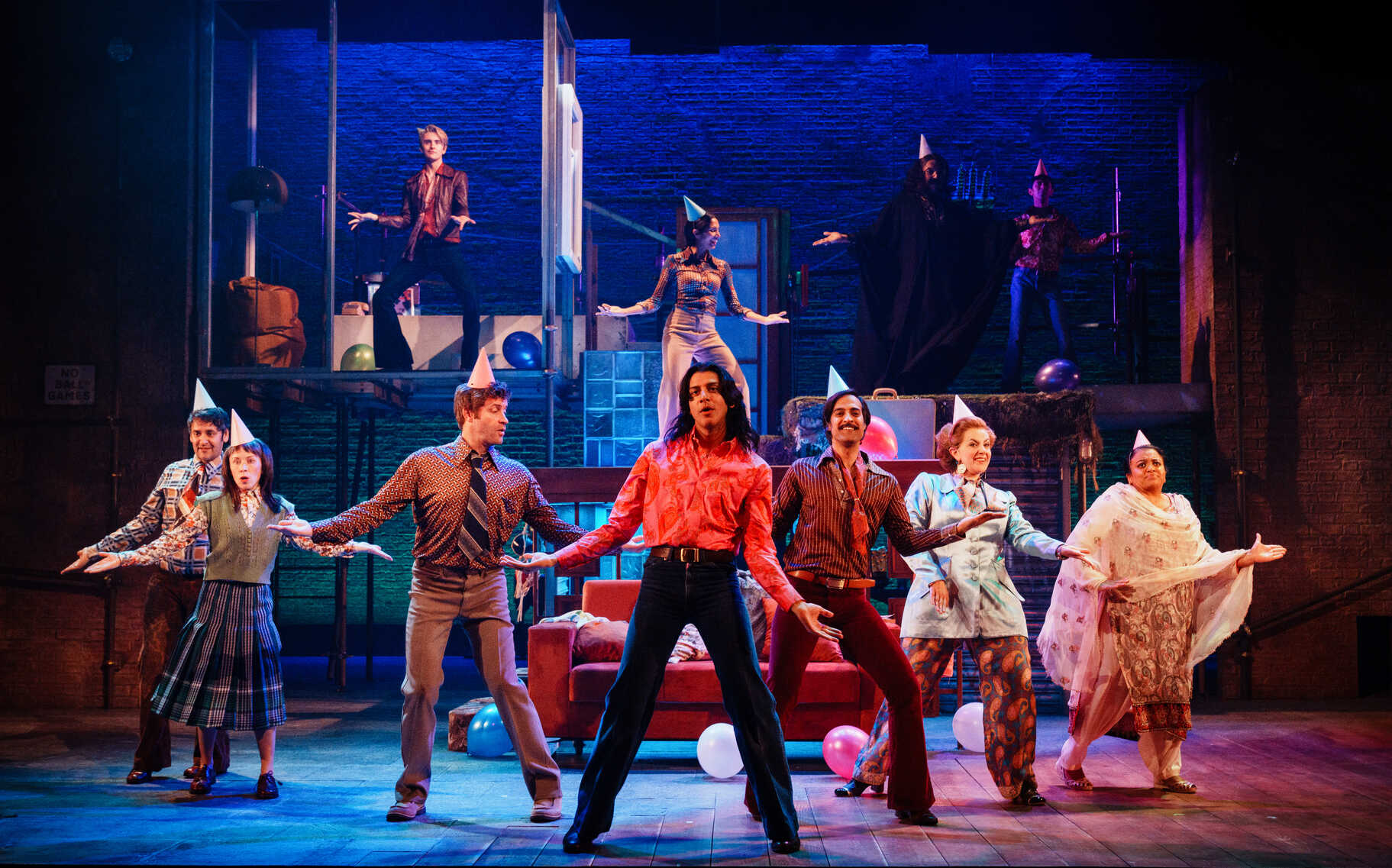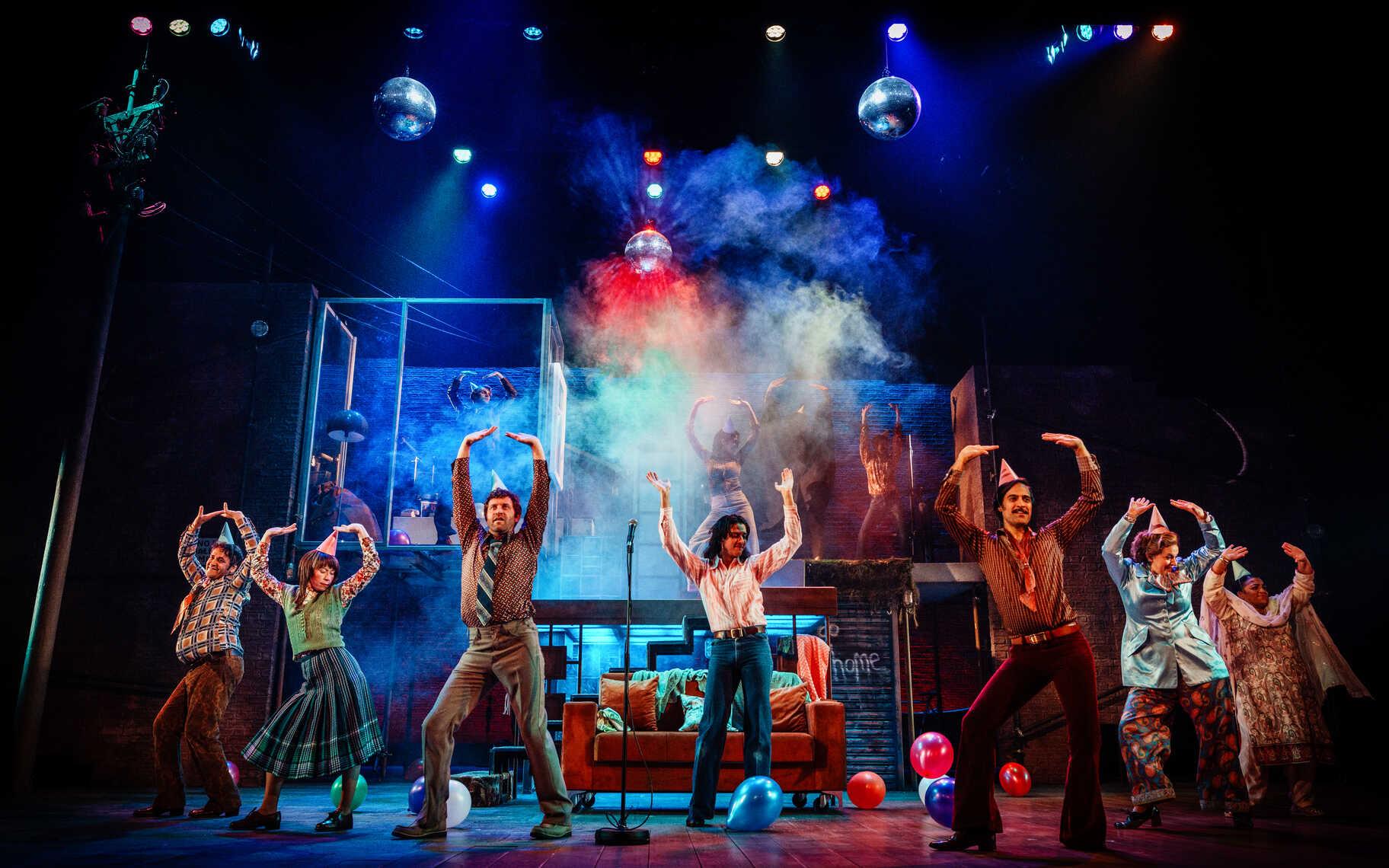
Based on the best-selling 70’s novel by Hanif Kereishi – which, in turn was adapted into a highly successful and well-received TV series – this play could have fallen into the trap of many cross-art recreations.
However, this production’s success – for that it is – can be attributed not only to the fabulous onstage cast, but to the wonderful choices made by Kureishi and Emma Rice for their combined theatre adaptation, and by Emma Rice for her clear, multi-layered and – ultimately – triumphant direction.
One of the more astute decisions was to lean into the nostalgia-fest by using a wide variety of popular music hits as backdrops, punctuation points or narration devices, as the need arises. Indeed, so much importance was placed on the music that its place in the ‘cast list’ was codified by an old record player being permanently positioned onstage, and one specific cast member being responsible for changing the record at the more impactful moments.
Another way the play avoids the nostalgia trap is simply by remaining culturally relevant.
The play starts off with main protagonist ‘Karim’ (Dee Ahluwalia) breaking the fourth-wall to inform us of the play’s time-frame, location and cultural/ political significance. In so doing, he light-heartedly lists the economic, political and cultural upheavals occurring in England during the book’s time-line; also adding a concise – yet pointed – reminder that present-day UK in a similar state of flux (especially in respect to immigration and an oftentimes problematic response to its own domestic multicultural realities).
We then get to meet – and spend time with – seemingly all of the family, friends, lovers, colleagues and acquaintances who impacted his life, and helped him accept his status as a bi-racial half-Indian boy growing up in London during the seventies, before developing his own unique identity, beliefs, convictions and life-path.
In this way, the story – and Kereishi’s work – is as relevant now as it ever was. With so many more elements than ever before – whether through social media or via our ever-present mobile phones – judging our character, life-choices and achievements before we’ve settled upon them, the principle message – that a multi-faceted human being shouldn’t be pigeon-holed by one singular trait, perceived economic position or cultural birthright.
Almost all the of play’s many characters (several of the cast playing multiple roles) are given adequate time to announce themselves as real humans, with their own personal traits, foibles, ambitions and failings. That this has been achieved while still keeping Karim in the central position – with no sign of hurriedness – is remarkable.
But this is no mere dramatic logistics set-up. The stories are heart-felt, the characters are genuinely affecting – even the ones who initially irritate – and the dialogue is always believable, sometimes insightful, and quite often downright hilarious.

Added to this are the choices made in tastefully depicting some of the source material’s frequent and varied sex scenes. I won’t spoil the fun, but suffice to say that you may never look at a banana – or a melon, for that matter – in the same way again.
The cast are uniformly excellent, Ahluwalia performing all the stages of Karim with precision and a relaxed charm. Also worthy of mention is the chameleonic Katy Owen (especially as Karim’s mother), Natasha Jayetileke (‘Jamila’) and Tommy Belshaw (mainly for his charismatic, troubled ‘Charlie’).
Rachana Jadhav’s set design is impressive. Built on several levels, it fulfils a wide variety of functions for several different characters and – with the aid of the odd movable couch, the contemporaneous newspaper ‘art exhibit’ and the aforementioned record player — it works splendidly.
Kudos to all the entire company of cast and creatives, especially to original author Kereishi; firstly for finding, developing and sharing his singular voice, and secondly for continuing to suggest – all these decades later – that others might best be advised to do likewise.
Need to know: The RSC’s The Buddha of Suburbia runs until 16 Nov 2024 at the Barbican, London






























